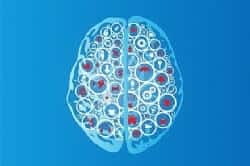
By Ginger Calhoun
Dementia is becoming more prevalent in our society, and it is affecting people at younger ages. Many people fear that a loved one or maybe even they may develop dementia. You may experience forgetfulness when it comes to names, appointments and/or misplacing items. When we are young, we do not always pay attention to these lapses, but as we get older we may become a little anxious about what it may mean.
Some people fear this forgetfulness indicates Alzheimer’s disease or some other form of dementia, but that may not be the case. It is normal to experience a certain amount of difficulty with recall as we age or as we become busier in our daily lives with increased stress levels. How can you know if what you are noticing is just a natural part of growing older and stressors of life, or if it may be something more disabling?
It is important to understand that in normal age-related forgetfulness, there is a mild decline in certain areas that do not interfere significantly with day-to-day functioning. It just takes longer to learn and process or recall information.
People age differently, both physically and cognitively. Certain changes are common in the aging process, but they do not necessarily occur for every person or around the same age for everyone. There are three causes of normal age-related memory loss:
What is true for any muscle is also true for the brain, you have to use it or lose it. Lifestyle, health habits, and daily activities have an impact on its health. Whatever your age, there are many ways to improve your brain health and slow down or even prevent memory loss.
Research shows there are ways to help maintain our best brain function as we age:
It is normal for cognition to decline as we age; however, the decline is merely a frustration and does not interfere significantly with daily life. If more serious signs and symptoms surface, they are not part of the normal aging process and may indeed be indicators of dementia or other medical issues. With true dementia, cognitive decline is a degenerative process. While treatment may slow the progression, continued decline is inevitable.
| Normal age-related memory changes: | Symptoms that may indicate dementia: |
| Able to function independently and pursue normal activities, despite occasional memory lapses | Difficulty performing simple tasks (paying bills, dressing appropriately, washing up); forgetting how to do things you have done many times |
| Able to recall and describe incidents of forgetfulness | Unable to recall or describe specific instances where memory loss caused problems |
| May pause to remember directions, but doesn’t get lost in familiar places | Gets lost or disoriented even in familiar places; unable to follow directions |
| Occasional difficulty finding the right word, but no trouble holding a conversation | Words are frequently forgotten, misused, or garbled; repeats phrases and stories in the same conversation |
| Judgment and decision-making ability the same as always | Trouble making choices; may show poor judgment or behave in socially inappropriate ways |
Apart from normal aging and dementia, other causes of cognitive impairment may be
With proper treatment of these health issues, cognitive impairment may be reversible, or they may significantly improve. This is why it is important to consult a physician as soon as concerns arise.
Whether cognitive decline is age-related, due to medical issue or is a developing form of dementia, it’s important to remember that life does go on. Many, many people continue to live joy-filled, satisfying lives, despite their memory loss. Live each day to its fullest; with the right support, memory loss doesn’t have to become an impossible obstacle.
About the author: Ginger Calhoun is the Director of Social Services at Good Samaritan Center, Advent Christian Village’s skilled nursing community in Dowling Park, Florida. She holds a bachelor’s degree in social work from Florida State University. Ginger has worked in outpatient mental health settings with adults, children and families; she has over 20 years of experience in long-term care; and she has extensive experience working with individuals living with Alzheimer’s disease and their families. Currently, she works in GSC’s Camelia neighborhood, a secure wing where residents with dementia are cared for.